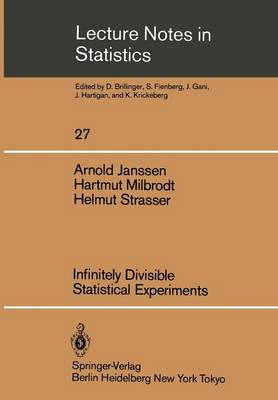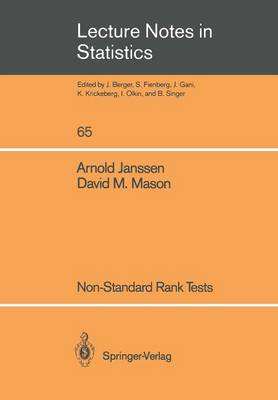Lecture Notes in Statistics
2 primary works
Book 27
Infinitely Divisible Statistical Experiments
by Arnold Janssen, Hartmut Milbrodt, and Helmut Strasser
Published 6 May 1985
This book is intended to give an account of the theory of infi- nitely divisible statistical experiments which started from LeCam, 1974. It includes a presentation of LeCam's basic results as well as new developments in the field. The book consists of four chapters written by different authors. Chapters I, III and IV have been prepared in Bayreuth with the support of the Deutsche Forschungsgemeinschaft (DFG); Chapter II is part of its author's Habilitationsschrift, 1982 (Dortmund). For the reader's convenience, the chapters have been unified in presentation, without neglecting differences in the individual styles of writing. The authors are grateful to Dr. C. Becker for carefully reviewing the manuscript. Furthermore, acknowledgements are gratefully extended to the DFG for partly subsidizing Dr. Becker and the second author by a grant. Some special words of thanks are due to Mrs. Witzigmann, who typed the final manuscript and its predecessors with patience and skill. Universitat Bayreuth und A. Janssen Universitat Dortmund, H. Milbrodt Dezember 1984 H. Strasser CONTENTS Preface Introduction L~its of Triangular Arrays of 14 I. EXEeriments (H. Milbrodt and H. Strasser) 1.
Basic Concepts 14 19 2. Gaussian Exper~ents 3. Introduction to Poisson Experiments 25 4. Convergence of Poisson Experiments 32 5. Convergence of Triangular Arrays 38 6. Identification of Limit Experiments 47 The Levy-Khintchine Formula for Infinitely 55 II.
Basic Concepts 14 19 2. Gaussian Exper~ents 3. Introduction to Poisson Experiments 25 4. Convergence of Poisson Experiments 32 5. Convergence of Triangular Arrays 38 6. Identification of Limit Experiments 47 The Levy-Khintchine Formula for Infinitely 55 II.
Book 65
This monograph extends the notion of locally most powerful rank tests to non-regular cases. Through this no- tion one is led in a natural way to "non-standard" rank tests. A nearly complete analysis of the finite sample and asymptotic properties of such rank tests is presented. Also an adaptive test procedure is proposed and studied, and the results of a Monte Carlo simulation are given which provide strong evidence that it should perform well in many practical situations. An appendix derives the limit experiments needed to investigate the asymptotic optimality of these "non-standard" rank tests under local alternatives. The results in the appendix should also be of separate interest.

